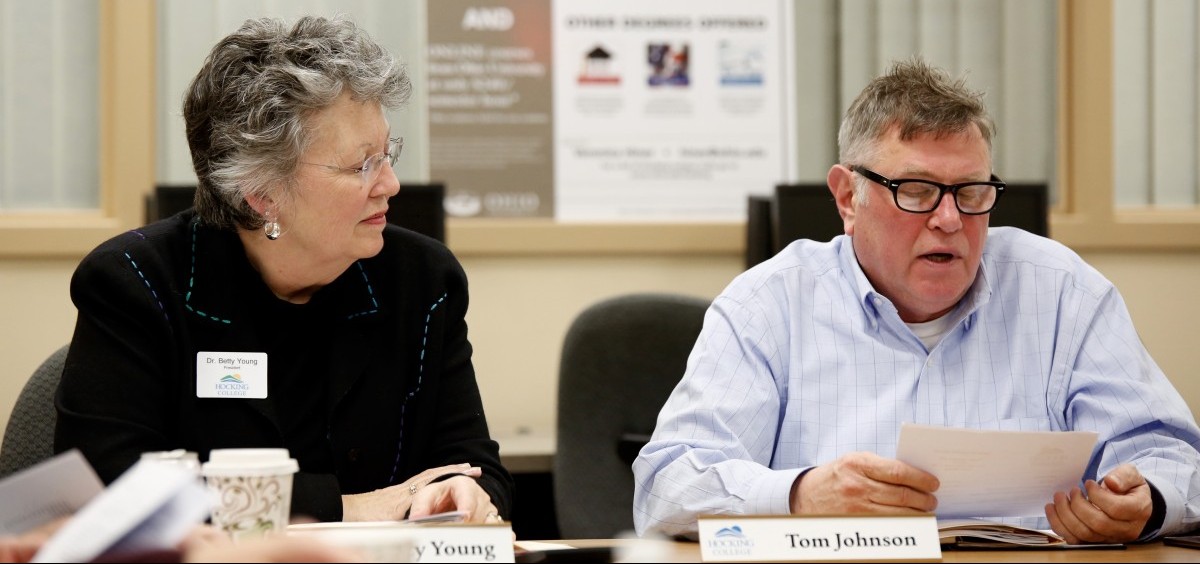News

Vote of ‘No Confidence’ Taken Against Hocking College President
By: Susan Tebben
Posted on:
Hocking College’s faculty and professional staff presented a 92 percent vote of “no confidence” in the leadership of the college’s president and vice president of academic and student affairs, but board members put their support behind the leadership Tuesday night.
At Tuesday night’s regular meeting of the Hocking College Board of Trustees, Chairman Tom Johnson announced the vote after the trustees came out of an hour-long executive session. Though he did not explain specifics of the executive session, he said the session involved employment and/or “charges or complaints” against a public employee.
After coming back into session, Johnson said the board had reviewed documentation from the Hocking College Education Association, which the association said they elected to provide the board “as a courtesy.”
In regards to college president Dr. Betty Young, the association received 92 votes of “no confidence” out of 99 voting members from the full-time faculty and professional staff. One vote was cast having “full confidence” in Young’s leadership, one voter said they had “some confidence” and five voters said they have “little confidence” in the leadership role of the president, according to the document, obtained by WOUB.
This is the fourth vote of no confidence voted against Young in her career. She also received votes of no confidence at Northwest Community College in Archbold, Ohio; Houston Community College’s Coleman College for Health Sciences in Texas; and Asheville-Buncombe Technical Community College in Asheville, North Carolina.
In comments included with the document, signed by Dr. J.B. Hart, president of the professional bargaining unit, the education association cited over-capacity classes, fewer class sections and the college’s “inability to find qualified adjuncts to replace faculty who were dismissed by Dr. Young or who chose to resign due to the toxic environment.”
“If something does not change, the college will collapse and become a local commuter community college with no unique, specialized programs that the college is known and respected for,” according to the document.
The faculty and professional staff said the decisions of the leaders at Hocking College had affected not only the faculty, but the students and the community.
“Too many decisions have been made that harm student success – from over-crowded classrooms to the inclusion of part-time instructors who have very limited teaching experience,” the document stated.
A “continuous decline in morale among staff, faculty, students, alumni and the community” was also cited as a reason for the vote, with the association arguing that “current leadership” decisions are deteriorating the quality of the college.
“We have stood in silent frustration as the administration minimalized or marginalized virtually every one of our concerns,” the document stated.
The association wrote that Young “fails to maintain the transparency of the leadership’s intentions, creating policies that eliminate trust within the organization, resulting in an extremely hostile work environment.”
Regarding Davis, members claimed Davis had a lack of experience outside of Hocking College and “is forced to invent processes and methods without any knowledge of how colleges and universities typically work,” according to the document.
“I do not know whether it is embarrassment or ego that forces her to write and implement policies without consultation of those affected her policies,” a member wrote in the document.
The decline in enrollment at the college was a focus of the comments made against Davis and they claim Davis does not properly vet the policies with faculty.
“Most times she has merely mentioned such policies in passing or has casually discussed them with a small group of faculty, telling the faculty members that the idea is being considered,” the document stated.
The chairman of the board specifically addressed the attitude of the faculty and professional staff in his comments during the meeting.
“The morale of staff and faculty is a critical thing at this college and we’ll be able to review that next time,” Johnson said.
Johnson said the board “takes these things very seriously,” and planned to hear solutions to the problems referenced in the letter from Young and Davis at the next board meeting. But Johnson expressed his support on behalf of the board for the two administrators.
“We’d also like to say that the board has full confidence in the job that Dr. Young and Dr. Davis are doing,” Johnson said. “There’s difficult times at the college, we’re navigating changes in the state funding formula, enrollment declines and we need to keep our eyes on… the metrics that are going to result in Hocking College being successful.
The board went into a second executive session at the end of the meeting regarding “charges or complaints” against a public employee, along with pending or imminent legal action and collective bargaining, Johnson said.
When they returned after about 45 minutes to adjourn the meeting, Young was not with the board. When reporters inquired at her office after the meeting, an administrative assistant said Young had already left the building.
Requests for comment were made to Young via email and phone Tuesday night and Wednesday morning, and no response has been received. Davis also declined comment to reporters.
A public records request has also been filed regarding the vote.
Read the entire letter about the vote here: No confidence letter.

